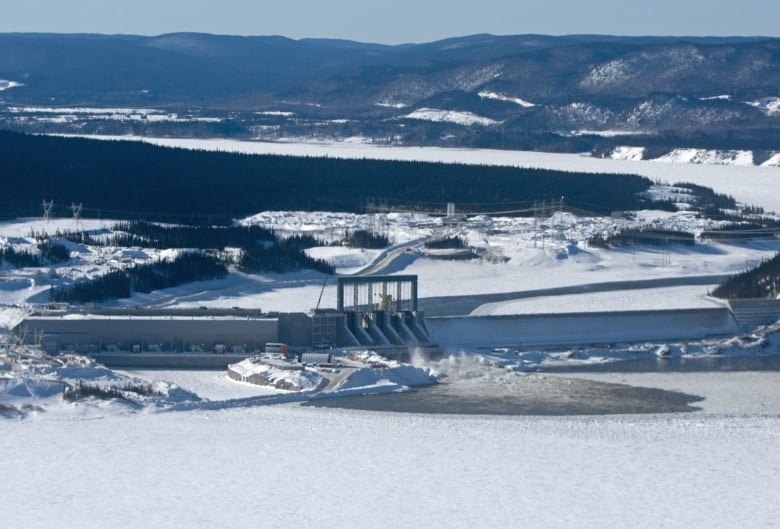High-performing Muskrat contractor hindered by Astaldi fallout, inquiry told
'You guys seem to know what you're doing,' commissioner says of Cahill-Ganotec joint venture
Fallout from the eviction of Astaldi from the Muskrat Falls project last fall is slowing the work of one of the highest-performing contractors on the project, the public inquiry investigating the project has learned.
And changes to the work have also driven up the cost of the contract awarded to Cahill-Ganotec, electrical engineer and project manager Tim Harrington told inquiry commissioner Justice Richard LeBlanc during testimony on Wednesday.
It's called a balance-of-plant contract, and was awarded to a joint venture of Newfoundland-based Cahill Group and Quebec-based Ganotec in mid-2018. The company is installing electrical, mechanical and architectural systems at the Muskrat Falls powerhouse.

It's separate from a contract awarded to Andritz Hydro, which is installing the turbines and generators at the powerhouse.
The Cahill-Ganotec contract was originally valued at $193 million, but the final forecast cost has since grown to $201 million because of various change orders, and the joint venture has also filed a claim against Nalcor for additional costs because of delays, though details of that claim were not released by the inquiry because the contract is ongoing.
Harrington's evidence highlights the fact that while Muskrat construction is more than 95 per cent complete, challenges remain on a project that is already billions over budget and at least two years behind schedule. Harrington also cast some doubt on Nalcor's plan to deliver first power from Muskrat this year.
It all raises new questions about the final bill for Muskrat, with Nalcor's last cost estimate for the project dating back to mid-2017 at an all-in cost of $12.7 billion, more than $5 billion over the original cost estimate at sanction in 2012.
Harrington's testimony, backed up by documentation, shows the contract is being hindered because Cahill-Ganotec crews are unable to access some work sites. He added that delays in the delivery of some key components ordered by Nalcor has also resulted in delays.
But Nalcor's decision last fall to evict Astaldi Canada from the project is also slowing things, Harrington explained.
Astaldi was awarded the critical civil contract to construct the powerhouse, spillway and other concrete infrastructure on the lower Churchill River in 2013.
The inquiry has heard how the Italian company struggled throughout 2014, gained momentum in 2015, but eventually ran into financial trouble.
Pennecon hired to finish work
Nalcor made at least two special payments of hundreds of millions to Astaldi in order to keep the work progressing, but finally had enough of the company last fall and kicked Astaldi off the project.
A Newfoundland and Labrador company, Pennecon, has been hired to finish Astaldi's work, but the cost of that contract has not been revealed, and Harrington said it hasn't been smooth sailing.
"Understandably they had a change-up in the main primary civil contractor on site back in the fall and subsequently [are] just working out their schedule with the new group, Pennecon, that's in," Harrington said.
"Ultimately that will also have an effect on how the turbines and generator assembly goes in terms of timing there."
A rare compliment from LeBlanc
The balance-of-plant contract is usually the last work to be completed, but until other work is finalized, Cahill-Ganotec crews are making limited progress.
"Once they work through that (Nalcor is) committed to giving us some more comprehensive 'here you go, these are your remaining interfaces and the milestones we expect you to hit,'" said Harrington.
Harrington described Cahill-Ganotec as one of the best-performing contractors on the project, with impressive productivity results.
And in a rare compliment from LeBlanc, the commissioner's parting message to Harrington was, "You guys seem to know what you're doing."
Pathway to first power a concern for Harrington
Meanwhile, the pathway to first power at Muskrat is raising concerns.
Nalcor has long said its plan is to produce first power from one of the four turbines at Muskrat later this year, and reach full commercial power about a year later.
But Harrington and others at Cahill-Ganotec have cautioned Nalcor, saying that such a plan might threaten productivity at the powerhouse.
"Construction tends to flow a little better when you're not working on live systems and everybody knows there's no live energy in the plant. But as soon as you start going into the commissioning phase and bringing systems online … that tends to slow things down."
In a briefing late last year, however, Nalcor told members of the Cahill-Ganotec team that its plan is to demonstrate Muskrat is capable of producing electricity, and then return to construction mode.
Harrington said this has the potential to "defer with our schedule provisions."